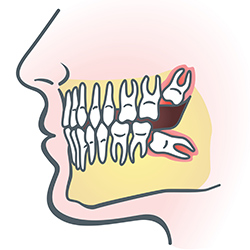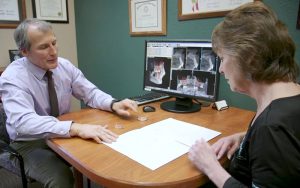Are Your Wisdom Teeth Impacted?
Have you been experiencing nagging pain in the back of your mouth? You might be dealing with impacted wisdom teeth. Millions of people face this issue, which often leads to discomfort, swelling, and even damage to surrounding teeth.
Our Loveland, CO dentist can diagnose and treat wisdom tooth impactions. If you suspect you need your wisdom teeth removed, contact our dental office today to schedule a consultation at (970) 669-3918.
What is a Wisdom Tooth Impaction?
A wisdom tooth impaction occurs when the jaw becomes smaller over time, leaving insufficient space for the third molars (wisdom teeth) This can result in various oral health problems, including cavities, gum disease, and infections. In many cases, the best solution is surgical tooth extraction.
Types of Wisdom Tooth Impactions
There are four primary types of wisdom tooth impactions:
- Mesial (Angular) Impaction: The most common type, where the tooth is partially erupted and angled towards the front of the mouth.
- Vertical Impaction: The tooth is in the correct position but remains below the gums.
- Horizontal Impaction: The tooth lies sideways beneath the gums, potentially damaging adjacent teeth.
- Distal Impaction: The tooth is angled towards the back of the mouth.
Symptoms of Impacted Wisdom Teeth
Common symptoms of impacted wisdom teeth include:
- Pain

- Swelling
- Changes in bite
- Difficulty chewing
- Bad taste in the mouth
- Bleeding
How Dentists Diagnose Impacted Wisdom Teeth
During your appointment, our dentist will conduct a thorough examination and take X-rays to assess the position of your lower and upper wisdom teeth. This information will help determine the type of impaction and the most appropriate treatment plan of surgical removal.
Frequently Asked Questions
Mesial impactions are the most common type of wisdom tooth impaction, often referred to as “angular impactions” due to the teeth being partially erupted and angled towards the front of the mouth.
There are three types of impaction: soft tissue, partial bony, and complete bony. Soft tissue impaction occurs when there’s not enough room to allow the gum tissue to retract, whereas partial bony impaction is when there’s enough space to allow the wisdom tooth to partially erupt, and complete bony impaction occurs when there’s no space for the tooth to erupt. A partially impacted wisdom tooth can still cause pain to other teeth if not removed by an oral surgeon.
Horizontal impactions are considered the most painful type of wisdom tooth impaction, while full-bony impacted teeth present the greatest challenge to extract due to being completely stuck in the jaw. Impacted wisdom teeth can cause tooth decay and pain if left untreated. Remove impacted wisdom teeth to protect nearby teeth.
Don’t Ignore Impacted Wisdom Teeth
By addressing impacted wisdom teeth promptly, you can prevent potential complications and maintain optimal oral health. To schedule an appointment, contact our Loveland dental office at (970) 669-3918. We welcome patients from Boulder, Fort Collins, and Evans.
